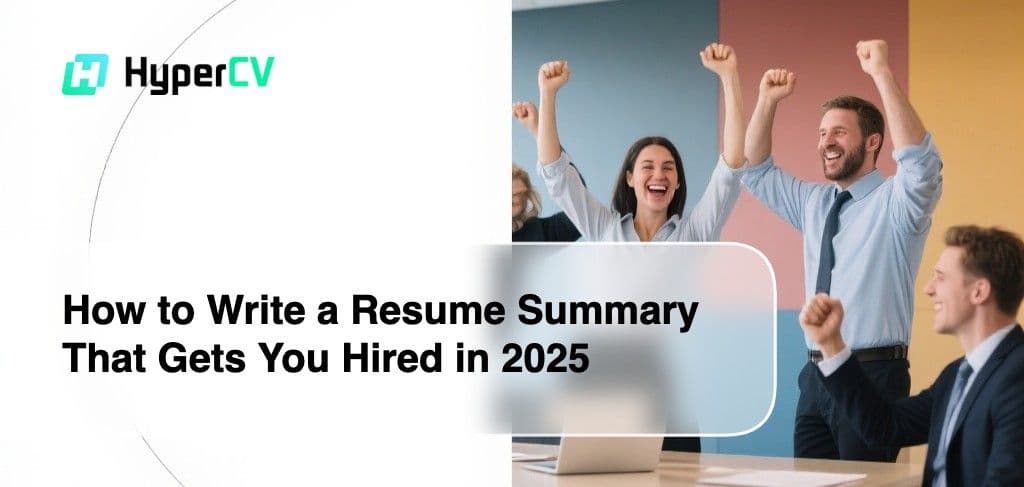How to Write a Resume Summary That Gets You Hired in 2025

Most job seekers struggle when they write their resume summary. They often use boring phrases like "dedicated worker" or create something that sounds robotic.
The truth is, your resume summary can be your best chance to catch an employer's eye. It's where you get to tell your story in your own words.
This guide shows you exactly how to write a resume summary that works. You'll also see real examples that you can adapt for your own resume.
What Makes a Great Resume Summary
A resume summary is a short paragraph at the top of your resume. It shows your best skills, experience, and wins. Think of it as your 30-second elevator pitch on paper.
According to My Perfect Resume, a professional summary is "a concise overview of your experience and strongest skills" positioned just under your contact information. It introduces your resume in three to four sentences and highlights your most significant accomplishments.
Here are examples for different career stages:
Experienced worker: "Manufacturing Operations Manager with 8+ years improving production efficiency. Six Sigma certified professional who cut costs by 22% while boosting quality scores."
Changing careers: "Marketing Professional moving into Data Analysis. Strong background in campaign metrics and customer research. Known for turning complex data into clear business insights."
New graduate: "Marketing graduate with leadership experience from campus organizations. Completed internship projects that increased social media engagement by 45%."
Key Elements Every Resume Summary Needs
When you write your summary, include these parts:
- Job title you're targeting
- Years of experience in your field
- Top 2-3 skills that match the job
- One specific achievement with numbers
- What you bring to the company
Why Your Resume Summary Matters
Your summary appears right under your contact info. This prime real estate gets read first, so make it count.
Most hiring managers spend just 6-8 seconds scanning your resume. A strong summary can make them want to read more.
When to Use a Resume Summary
Use a summary when you:
- Have relevant work experience
- Want to highlight specific skills
- Need to explain a career change
- Have impressive achievements to share
When to Skip It
Skip the summary if:
- You're applying for your first job ever
- Your work history clearly matches the job
- You prefer using a resume objective instead
Resume Summary vs Resume Objective
Both go at the top of your resume, but they serve different purposes.
| Resume Summary | Resume Objective |
|---|---|
| Shows what you offer | Shows what you want |
| Focuses on past wins | Focuses on future goals |
| Best for experienced workers | Best for new graduates |
| Highlights skills and results | Highlights motivation and interests |
Most people should use a summary. It keeps the focus on value you bring, not what you hope to get.
Step-by-Step Guide to Writing Your Summary
Step 1: Start With Your Target Job Title
Use the exact job title from the posting when possible. This helps your resume show up in computer searches.
Research shows resumes with matching job titles get 10 times more interviews.
If you're changing careers, try phrases like:
- "Marketing professional transitioning to sales"
- "Teacher moving into corporate training"
Step 2: Add Your Experience Level
Mention how many years you've worked in your field. This gives employers a quick sense of your background.
Examples:
- "5+ years in customer service"
- "Experienced project manager with 7 years"
- "Recent graduate with internship experience"
Step 3: Highlight Key Skills
Pick 2-3 skills that match the job posting. These should be your strongest abilities that employers want.
Look at the job description for clues about what to include.
Step 4: Include a Specific Achievement
Add one or two wins that show your impact. Use numbers whenever you can.
Good examples:
- "Increased sales by 30%"
- "Managed team of 12 people"
- "Reduced processing time by 2 hours daily"
If you're new to work, use achievements from school, internships, or volunteer work.
Step 5: Show Your Value
End with how you help companies succeed. This connects your background to what employers need.
Examples:
- "Known for building strong client relationships"
- "Skilled at solving complex technical problems"
- "Recognized for training high-performing teams"
Simple Formula for Any Resume Summary
Here's an easy template you can customize:
[Job Title] with [X years] experience in [skill 1], [skill 2], and [skill 3]. Proven ability to [achievement 1] and [achievement 2]. Known for [your strength or work style].
Example: "Digital Marketing Manager with 6 years experience in content creation, social media strategy, and email campaigns. Proven ability to increase website traffic by 50% and boost email open rates by 35%. Known for creative problem-solving and data-driven decisions."
Tailoring Your Summary for Each Job
Using the same resume for every job is a big mistake. Here's why customizing matters:
Most companies use computer systems called ATS to sort resumes. Recruiters search these systems using keywords from job postings.
As Novoresume explains, "Tailoring your resume summary to the job description can also help you get past Applicant Tracking Systems that companies use to filter through resumes." This software scans applications and removes candidates who don't mention specific skills or include enough keywords from the job description.
Jobscan research shows that 99.7% of recruiters use filters to find candidates. They search by:
- Skills (76.4%)
- Education (59.7%)
- Job titles (55.3%)
- Certifications (50.6%)
- Years of experience (44%)
Your summary is perfect for including these keywords. Read each job posting carefully and include relevant terms in your summary.

Resume Summary Examples by Career Stage
For Experienced Professionals
When you have several years of experience, focus on your biggest wins and specialized skills.
"Senior Accountant with 10+ years managing financial operations for mid-size companies. CPA certified with expertise in tax preparation, budget forecasting, and audit management. Reduced month-end closing time by 40% through process improvements. Recognized for accuracy and attention to detail."
For Career Changers
When switching fields, connect your old skills to your new goals.
"Sales Manager transitioning to Human Resources. 8 years building relationships and solving people challenges in fast-paced environments. Strong background in training, performance coaching, and conflict resolution. Eager to apply interpersonal skills to employee development and company culture."
For Recent Graduates
Without much work experience, highlight education, internships, and relevant projects.
"Business Administration graduate with strong analytical and communication skills. Completed data analysis internship where research project influenced company pricing strategy. Active in student leadership roles and volunteer community outreach programs."
Common Mistakes to Avoid
Don't use personal pronouns. Never write "I," "me," or "my" anywhere on your resume.
Avoid vague phrases. Skip meaningless terms like "hard-working" or "team player."
Don't make it too long. Keep your summary to 3-4 sentences maximum.
Skip outdated skills. Don't mention old software or methods unless the job specifically asks for them.
Avoid being too general. Make sure your summary connects to the specific job you want.
15 Resume Summary Examples by Industry
For more detailed industry-specific examples, My Resume Mentor provides proven resume summary examples for 20 in-demand professions with actionable writing tips to help you stand out from the competition.
Marketing
"Digital Marketing Specialist with 4 years driving online growth for e-commerce brands. Increased social media engagement by 60% and improved conversion rates by 25% through targeted campaigns. Expert in Google Analytics, Facebook Ads, and content strategy."
Sales
"B2B Sales Representative with 5 years exceeding quotas in competitive technology markets. Consistently ranked in top 10% of sales team with $2M+ annual revenue. Skilled in consultative selling, CRM management, and building long-term client partnerships."
Healthcare
"Registered Nurse with 6 years in emergency and critical care settings. Recognized for excellent patient advocacy and family communication during high-stress situations. Certified in Advanced Cardiac Life Support with experience training new staff members."
Technology
"Software Developer with 3 years building web applications using JavaScript, Python, and React. Led development of customer portal that reduced support tickets by 30%. Strong problem-solving skills with experience in agile development environments."
Education
"Elementary Teacher with 8 years creating engaging learning environments for diverse student populations. Improved reading scores by 20% through innovative literacy programs. Skilled in classroom management, parent communication, and curriculum development."
Finance
"Financial Analyst with 4 years supporting strategic decision-making for Fortune 500 companies. Created financial models that identified $500K in cost savings opportunities. Expert in Excel, SQL, and financial forecasting with strong presentation skills."
Customer Service
"Customer Success Manager with 5 years building relationships and reducing churn for SaaS companies. Maintained 95% customer satisfaction rate while managing 200+ client accounts. Known for turning frustrated customers into brand advocates."
Operations
"Operations Coordinator with 6 years streamlining processes in manufacturing environments. Implemented quality control system that reduced defects by 45%. Experienced in inventory management, vendor relations, and cross-functional team leadership."
Human Resources
"HR Generalist with 7 years supporting employee lifecycle from recruitment to retirement. Reduced time-to-hire by 35% through improved screening processes. Expert in benefits administration, employee relations, and compliance training."
Accounting
"Staff Accountant with 3 years managing full-cycle accounting for small businesses. Prepared accurate financial statements and maintained clean audit records. Proficient in QuickBooks, Excel, and accounts payable/receivable processes."
Project Management
"Project Manager with 5 years delivering complex initiatives on time and under budget. Successfully managed $10M+ in project portfolios with 98% on-time completion rate. PMP certified with expertise in risk management and stakeholder communication."
Graphic Design
"Graphic Designer with 4 years creating visual content for digital and print media. Redesigned company website that increased user engagement by 40%. Skilled in Adobe Creative Suite, brand development, and collaborative design processes."
Administrative
"Executive Assistant with 6 years supporting C-level executives in fast-paced environments. Managed complex calendars and travel arrangements while maintaining strict confidentiality. Known for anticipating needs and solving problems before they arise."
Research
"Market Research Analyst with 3 years conducting consumer studies for retail and technology companies. Presented findings that influenced $5M product launch decisions. Expert in survey design, statistical analysis, and data visualization."
Writing
"Content Writer with 4 years creating compelling copy for B2B software companies. Published articles that generated 100,000+ website visitors and 500+ qualified leads. Experienced in SEO optimization, email marketing, and social media content."
Final Tips for Success
Write your summary last. Complete the rest of your resume first. This helps you see your strongest points clearly.
Use active language. Choose strong action words that show impact and energy.
Keep it current. Update your summary for each application based on the job requirements.
Test different versions. Try writing 2-3 versions and see which one feels most natural.
Get feedback. Ask trusted friends or mentors to review your summary before sending applications.
For additional guidance, Jobscan recommends creating a compelling paragraph that highlights your most relevant skills, experience, and accomplishments, tailored to the specific job by incorporating keywords from the job description.
Remember, your resume summary is often the first thing employers read. Make those few sentences count by highlighting your best qualities and showing exactly how you can help their company succeed.
With practice and the right approach, writing a resume summary becomes much easier. Focus on your wins, use specific numbers, and always connect your experience to what employers need. This strategy will help you stand out from other candidates and get more interviews.